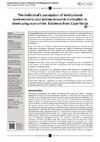Please use this identifier to cite or link to this item:
https://accedacris.ulpgc.es/jspui/handle/10553/43932
| Title: | The individual’s perception of institutional environments and entrepreneurial motivation in developing economies: Evidence from Cape Verde | Authors: | García Cabrera, Antonia Mercedes García Soto, María Gracia Dias-Furtado, Jeremias |
UNESCO Clasification: | 5311 Organización y dirección de empresas | Keywords: | Entrepreneurial motivation Entrepreneurship Institutional environment New institutional theory Developing economy |
Issue Date: | 2018 | Journal: | South African Journal of Economic and Management Sciences | Abstract: | Background: International organisations and national governments have made great efforts to stimulate entrepreneurial activity in the less-advanced economies, but the results of their programmes have often been disappointing. This may be because a distinction between the institutional factors that generate an individual’s desire to become an entrepreneur and those that generate a motivation that actually leads to entrepreneurial action has not been considered sufficiently. Aim: This work is an attempt to respond to the following question on the basis of the individual’s perception of regulative, normative and cognitive institutions: In developing economies, what institutional factors generate an entrepreneurial motivation that makes individuals desire to become entrepreneurs and what factors cause an entrepreneurial motivation that actually leads them to entrepreneurial action? Setting: We use empirical evidence from the African nation of Cape Verde for the analysis. The study was carried out on 6 of the 10 islands of the archipelago. Method: The sample of study comprises 237 people: 93 entrepreneurs and 144 individuals with different levels of desire to become an entrepreneur. We used multiple linear regression analysis to test the hypotheses. Results: Our findings show that institutional factors which generate the entrepreneurial motivation that forges an individual’s desire to become an entrepreneur, and those which generate the motivation that leads him or her to actually set up his or her own business are not the same. We also find differences in the institutional factors that influence the opportunity, necessity and social components of entrepreneurial motivation. Conclusion: Theoretical implications for better understanding the factors that condition entrepreneurship in developing economies and practical implications useful for improving the planning of growth in these countries are offered. | URI: | https://accedacris.ulpgc.es/handle/10553/43932 | ISSN: | 1015-8812 | DOI: | 10.4102/sajems.v21i1.2377 | Source: | South African Journal of Economic and Management Sciences [ISSN 1015-8812], v. 21 (1), a2377 |
| Appears in Collections: | Artículos |
SCOPUSTM
Citations
8
checked on Jun 8, 2025
WEB OF SCIENCETM
Citations
11
checked on Jan 25, 2026
Page view(s)
71
checked on Jan 11, 2026
Download(s)
67
checked on Jan 11, 2026
Google ScholarTM
Check
Altmetric
Share
Export metadata
Items in accedaCRIS are protected by copyright, with all rights reserved, unless otherwise indicated.
